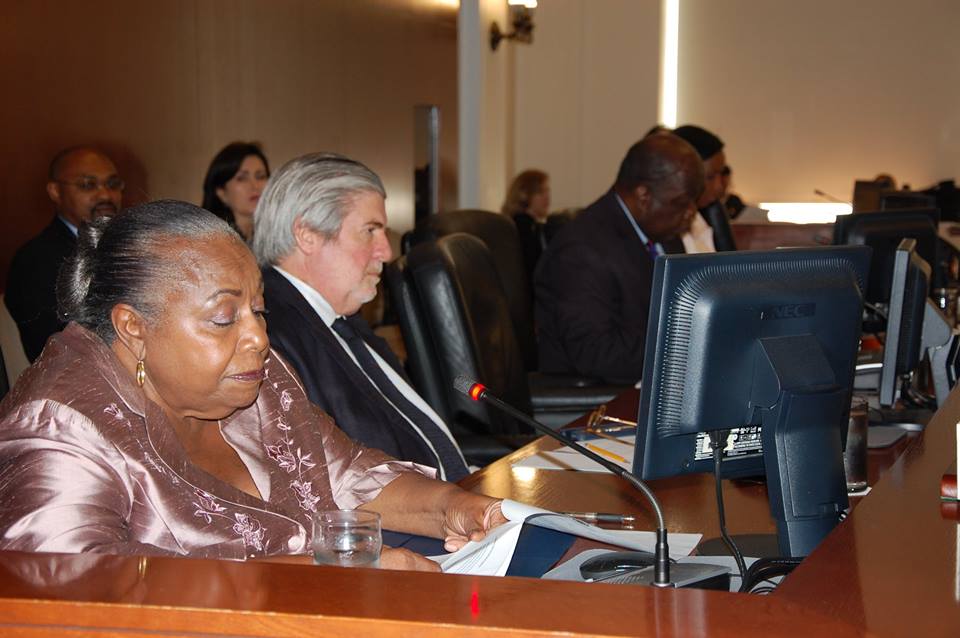BOSTWICK PRESENTS REPORT ON JAMAICA ELECTIONS TO OAS

Former Bahamas Minister of Foreign Affairs Janet Bostwick is seen presenting the report of the OAS Electoral Observation Mission on the recent general elections in Jamaica during a meeting of the OAS Permanent Council on Wednesday, July 27, 2016. Second from left is OAS Secretary for Legal Affairs Jean Michel Arrighi and at right is Dr. Elliston Rahming, Bahamas Ambassador and Permanent Representative to the OAS and Chair of the Permanent Council. In the back row at left is Mr. Chet Neymour, Deputy Chief of Mission, Bahamas Embassy.
WASHINGTON, D.C. — Former Bahamas Minister of Foreign Affairs Janet Bostwick, who headed the Organization of American States (OAS) Electoral Observation Mission (EOM) at the general elections held earlier this year in Jamaica, officially presented the Mission’s report to the OAS on Wednesday, July 27, 2016, during a meeting of the Permanent Council in the Simon Bolívar Hall of the OAS headquarters at 17th Street and Constitution Avenue, NW.
The meeting was presided over by His Excellency Dr. Elliston Rahming, Ambassador and Permanent Representative of The Bahamas to the OAS and Chair of the Permanent Council.
Dr. Rahming, who is also The Bahamas’ Ambassador and Permanent Representative to the United Nations, assumed the chairmanship of the OAS Permanent Council on July 1 for a three-month period, ending on September 30.
Mrs. Bostwick, who has had a long and distinguished career in politics in The Bahamas, was appointed to head the EOM for the Jamaica elections by OAS Secretary General Luis Almagro in response to an invitation from the Electoral Commission of Jamaica (ECJ) to observe that country’s General Parliamentary Elections held on February 25, 2016. The EOM included a team of 23 international experts and observers from 15 OAS Member States and two Observer States.
In her comprehensive report presented to the Permanent Council, Mrs. Bostwick noted that in the days “prior to the election, the Observation Mission met with a wide variety of actors, including the electoral authorities, representatives of political parties, state authorities, the private sector, members of civil society and advocacy organizations, members of the Diplomatic Corps, and local and international observers, in order to gather information and discuss their views on the electoral process.”
“These discussions were indispensable to the Mission in acquiring deeper insight into the Jamaican electoral process, the level of preparedness of the electoral machinery, issues surrounding the elections and the positions thereon of the various stakeholders,” Mrs. Bostwick said. “Two issues that emerged repeatedly in the discussions and which were of concern to the Observation Mission, were the high level of voter apathy in the country – particularly among young people – and the incidents of violence, which, though not necessarily politically motivated, had occurred within the context of electoral activities.”
She noted that the Mission “also took note, once more, of the authority, independence and competence of the ECJ, which continues to provide clear and solid leadership to the electoral process in Jamaica.”
“With the exception of two incidents witnessed by OAS Observers in the late evening, where encounters among supporters of competing parties required the intervention of security personnel, the Mission noted that, for the most part, Election Day progressed in a calm and peaceful manner,” Mrs. Bostwick said. “At the end of Election Day, the Mission observed the tabulation, transmission, consolidation and publication of the preliminary results, which was accomplished in a prompt and efficient fashion. These results indicated that of the 63 seats contested in the elections, 33 seats were won by the Jamaica Labour Party (JLP) and 30 seats by the People’s National Party (PNP).
However, the OAS Mission noted that despite “the growing number of Jamaican women in decision-making positions and their presence in most areas of the electoral campaign, women continue to be underrepresented in actual nominations for the electoral contest and in their election to the House of Representatives,” pointing out that of the 152 candidates contesting the 2016 elections, 26 candidates or 17 percent were women and only 11 of the 63 candidates elected to the House were women.
“In its preliminary statement on the day after the elections,” Mrs. Bostwick said, “the OAS Mission had called on political parties, civil society organizations and the ECJ to work together to develop affirmative actions that might help to increase the participation of women in the electoral competition.”
Addressing the issue of voter turnout in Jamaica, Mrs. Bostwick said it has “been declining since the 1990s, with the 2011 election reaching a participation of just 52.6% of voters.”
“The OAS Mission noted, with concern, that this election was not an exception, and the trend continued with a turnout of only 48.37%,” Mrs. Bostwick said. “The apathy observed in the general population, particularly among young people, was disquieting, as robust participation in a country’s electoral processes is essential to maintain and strengthen the democratic system of government and to identify, encourage and develop the next cadre of political leaders.”
Mrs. Bostwick has the distinction of being the first female Member of the House of Assembly in The Bahamas, serving in that august chamber from 1977 to 2002.] She was appointed as Minister of Housing and Labour from 1992 to 1994 and served from 1994 to 1995 as Minister of Justice and Immigration. Between 1995 and 2001, she served as Attorney General and simultaneously as Minister of Foreign Affairs (1995) and Minister for Women’s Affairs (1995-2001).
